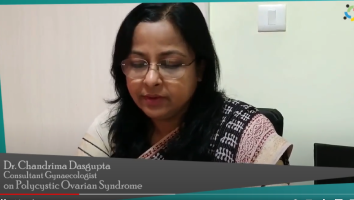What is PCOS?
PCOS is the short form for Poly-Cystic Ovary Syndrome. Some also know it as PCOD. It occurs when women have an imbalance in their hormones. It occurs in women of childbearing age. There is a need to diagnose PCOS and treat this condition early to prevent infertility, heart disease, and diabetes. Many women have PCOD but do not know about its presence. A study found that almost 70% of women suffering from PCOS have not been diagnosed with it.
The ovary is present in the female reproductive system. Each month, the ovaries release an egg. This egg is available for fertilization by the men’s sperm. The immature egg is present in a sac which is known as a follicle. Hormones help in the maturation and release eggs from the ovary.
In PCOS, an immature egg never matures. The follicle takes the form of a cyst that contains fluid. The ovary has many fluid-filled cysts. Thus, this disease is known as polycystic ovary syndrome (‘poly’ means many).
Medica’s Obstetrics and Gynecology department offers comprehensive diagnosis and management of the entire scope of clinical pathology involving female reproductive organs and provides advanced care for both pregnant and non-pregnant patients. We believe in administering holistic management of all patients, encompassing their mental, physical and emotional health as a means to provide a complete solution for all their gynaecological problems. Our department is fully integrated with state-of-the-art treatment units and facilities that enable our Gynaecologists to treat you better.
Free Doctor Assessment
What are the Causes of PCOS?
The exact cause of Polycystic Ovarian Syndrome is not known. Some factors may play a role in PCOS. These are:
- Hereditary: Women with a family history of PCOS are at high risk for getting this condition. There may be more than one gene responsible for this condition.
- Insulin Resistance: Insulin helps in sugar metabolism. In insulin resistance, the cells are unable to use insulin. It results in high insulin levels that may cause PCOS.
- Inflammation: Low-grade inflammation increases the risk of developing PCOS. Inflammation also raises the level of male hormones.
- Higher Levels of Androgens: Sometimes, the ovary increases the production of androgens that causes symptoms of PCOS, such as infertility and excess hair growth.
What are the Signs and Symptoms of PCOS?
Women suffering from PCOS may have the following signs:
- Irregular periods: It is the most common sign of PCOS. Women having PCOS may have less than eight periods in a year. Women may also have a gap of over 35 days between periods. In PCOS, there is a hormonal imbalance. It results in irregular periods.
- Heavy bleeding: Normal bleeding occurs due to the balance between estrogen and progesterone. In PCOS, there is a high amount of estrogen and a low progesterone level. This hormonal imbalance causes heavy menstrual bleeding.
- Infertility: PCOS is one of the most common causes of infertility. There is a problem with the maturation and release of the eggs. If there is no healthy egg for fertilization by sperm, the women cannot achieve pregnancy.
- Pimples and acne: Sebaceous glands are present on the skin. In PCOD, the level of male hormones or androgen rises. This rise in androgen stimulates the secretion of excess sebum from the glands. It results in the development of pimples.
- Growth of hair on the face: Facial hair growth is a distressing and visible symptom of PCOS. Around 70% of the women have hair growth in uncommon areas, such as on the face, belly, chest, and back. It may be due to the high level of androgens (male hormones) in circulation.
- Increase in weight: PCOS may cause weight gain that may cause high blood pressure. About 80% of women with PCOS are overweight or obese. One reason for this is continuous exposure to male hormones.
- Dark skin patches: PCOS may result in dark skin patches in the armpits, groin area, under the breasts, and behind the neck. It is seen more in obese or overweight women with the condition.
- Baldness: Because of the high circulating levels of androgens, PCOS may cause male pattern baldness. Scalp hair becomes thin, and there is an increase in hair fall.
- Extra skin development: Some women may also have excess skin development. These are known as skin tags. They are present in the areas having dark patches.
- Depression: Most women with PCOS also show signs of depression and anxiety. It may be due to hormonal imbalance. It may also be due to the presence of distressing symptoms. PCOS may also cause headaches and mood changes.
- Sleep problems: This condition may result in sleep apnea. They have a problem taking a breath at night. It reduces the quality of sleep. Obese women with PCOS are at 5-10 times more risk for sleep problems than women without PCOS.

Minimally Invasive
Surgery

World Renowned
Experts
EMI Facility
Available

Covid Safe
Environment
When to Consult a Doctor?
It is necessary to consult with the doctor in case the women have:
- Heavy, irregular, or no menstrual bleeding
- Facial hairs
- Infertility
- Diabetes symptoms like excessive thirst, fatigue, and blurred vision
- Hair loss (male pattern baldness)
What are the Treatments for PCOS?
Some of the options for PCOS treatment are:
- Lifestyle alterations: Lifestyle change, such as weight loss, is the initial treatment for PCOS. Women can manage PCOS symptoms by reducing 5-10% of body weight. It decreases insulin levels and the risk of diabetes. It also treats infertility and regularizes the menstrual cycle.
- Medications: Patients may have birth control pills to correct the hormonal imbalance. and to regulate the periods. These drugs lower the risk of cancer of the uterus lining. The doctor also gives the drugs for ovulation. Some of these drugs stimulate the ovaries.
- Excessive hair growth treatment: Treatment of excessive hair growth in PCOD may need oral medications, creams, or procedures. Electrolysis is a method that damages the hair follicles and stops hair growth.
- Surgery: There are cases when women with PCOS cannot get pregnant even after different treatments. The doctor for PCOS may advise surgery in these cases. Ovarian drilling is a method that improves normal ovarian function and promotes ovulation.
- Home remedies: Several home treatments also help in preventing complications. Staying active and performing regular exercise reduces insulin resistance and lowers the risk of diabetes. A diet low in carbohydrates can help in lowering insulin levels. Complex carbohydrates in food prevent the sudden rise of blood sugar levels.














